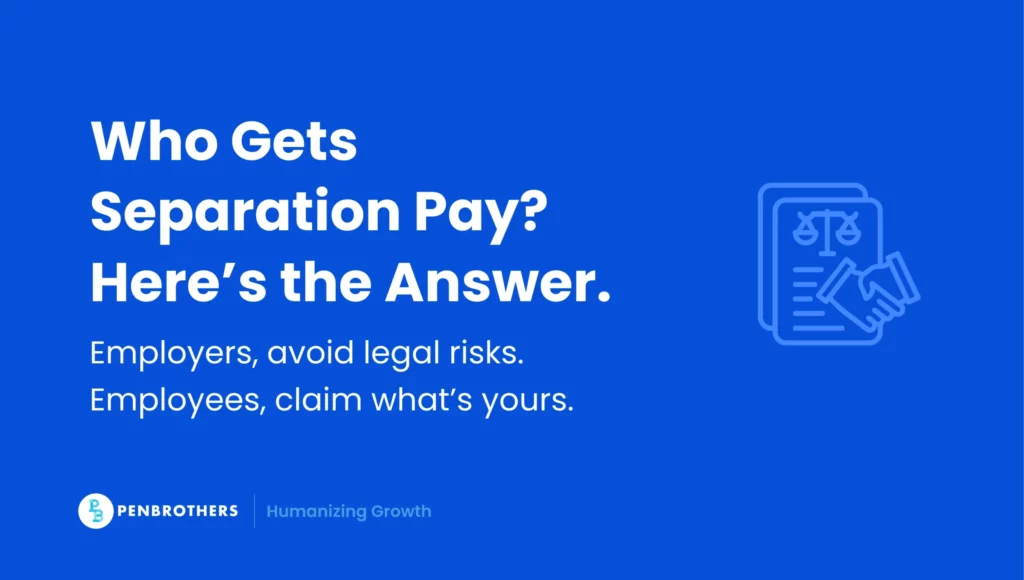Separation pay is a financial benefit provided to employees who are involuntarily terminated under specific conditions. It serves as financial support for workers who lose their jobs due to reasons beyond their control. However, not all terminated employees are entitled to this pay. The eligibility criteria depend on factors such as the reason for termination, employment classification, and legal requirements set by the Labor Code of the Philippines.
Misconceptions about this pay often arise, particularly concerning contractual employees, mass layoffs, and tax implications. This guide breaks down these critical aspects to ensure employees and employers understand their legal rights and obligations.
Key Takeaways
- A Legally Mandated Benefit for Specific Terminations: Separation pay is legally required under the Philippine Labor Code, but it is not granted to all terminated employees. It is only provided to those who are let go for specific “authorized causes” related to business operations.
- Know the “Authorized Causes” for Eligibility: An employee’s eligibility for separation pay is strictly limited to terminations resulting from business reasons. These include retrenchment (downsizing to prevent losses), redundancy (the position is no longer necessary), the closure of the business, or the installation of labor-saving devices.
- Not Applicable for Resignation or Termination for Cause: Employees who are terminated for “just cause” (e.g., serious misconduct, neglect of duty, or fraud) or who voluntarily resign from their positions are not entitled to receive separation pay under the law.
- The Calculation is Based on a Legal Formula: The amount of separation pay is set by the Labor Code. It is calculated as either one-half month’s pay or one full month’s pay for every year of service, depending on the specific authorized cause for the termination.
Who Qualifies for Separation Pay?
Under Articles 298 and 299 of the Labor Code of the Philippines, separation pay is not a universal benefit. It is tied specifically to authorized causes of termination. This means employees are entitled to separation pay only when their employment ends for reasons beyond their control, and not due to their own fault.
Here’s when the law mandates it:
- Retrenchment due to economic losses – When a company is forced to cut costs to prevent further losses, employees let go must be compensated.
- Redundancy – If a position is declared unnecessary because of restructuring, overlapping functions, or new systems, the displaced employee qualifies.
- Closure or cessation of business (not due to serious losses) – When an employer shuts down operations for reasons such as retirement, shifting industries, or moving abroad, separation pay is required.
- Installation of labor-saving devices – When technology or automation takes over a job, displaced employees are entitled to compensation.
- Health reasons – If an employee’s certified illness or medical condition prevents them from performing their work and no suitable alternative is available, separation pay applies.
Employees terminated due to just causes like serious misconduct, willful disobedience, gross neglect, fraud, or violation of company policies, are not entitled to separation pay. In these cases, the law protects the employer from being compelled to reward wrongful conduct.
Too often, employees assume separation pay is automatic, while employers sometimes use it as a bargaining chip even when the law doesn’t require it. Both misunderstandings can lead to disputes, DOLE complaints, or costly litigation.
Pay for Outsourced and Contractual Employees
Outsourced workers, employed through a manpower agency, typically do not receive this pay from the company they are assigned to. Instead, their employer (the agency) is responsible for handling their termination benefits, if applicable.
For contractual employees, eligibility for this pay depends on the nature of their termination:
- If a fixed-term contract expires as agreed, no this pay is required.
- If a company pre-terminates a contract without just cause, the employee may be entitled to compensation.
- If illegal labor contracting is proven, the principal employer may be held liable for this pay.
Key Takeaway: Employees must verify whether they are regular employees or engaged under a third-party agency to determine their entitlements.
Fixed-Term Employees: Do They Get Separation Pay?
Fixed-term employment is legally recognized in the Philippines, provided that:
- The contract is not designed to circumvent regularization.
- Both employer and employee voluntarily agreed to the fixed-term arrangement.
Employees whose contracts naturally expire are not entitled to this pay. However, if a fixed-term contract is terminated early without justifiable cause, the employer may be required to compensate the employee.
Employer Compliance Tip: Employers should ensure that fixed-term contracts are valid and not used to avoid regularization, as this can lead to labor disputes.
Related: Difference Between Freelancers and Outsourced Workers
Separation Pay in Mass Layoffs and Retrenchment
Mass layoffs and retrenchment involve the termination of multiple employees due to financial struggles or restructuring. Employers must comply with:
- Notice Requirement: At least one month’s notice to employees and DOLE (Department of Labor and Employment).
- Fair Selection Criteria: Retrenchment cannot be arbitrary; it must be based on reasonable standards.
- Calculation:
- Retrenchment or Closure (without serious losses): Half-month salary per year of service
- Redundancy or Labor-saving Devices: One month’s salary per year of service
- Retrenchment or Closure (without serious losses): Half-month salary per year of service
Related: How Payroll Works in the Philippines
Why This Matters: Employers who fail to comply with due process risk illegal dismissal claims, which may lead to reinstatement or full back wages.
What Pay Do I Get When I Resign?
When you decide to resign, you don’t lose the money you’ve already earned. By law and practice, your employer must give you what’s called your final pay or a complete payout of all pending compensation and benefits up to your last day of work.
Here’s what’s typically included:
1. Salary you’ve already worked for
Any days or hours you’ve reported for duty before your final day must still be paid. This is the foundation of your final pay.
2. Pro-rated 13th-month pay
The 13th month isn’t all-or-nothing. Whatever portion of the year you’ve worked, you’re entitled to receive the equivalent slice of your 13th-month pay.
3. Conversion of unused leave
If you’ve earned Service Incentive Leave (SIL) or your company offers leave credits that can be converted to cash, your employer must pay out the balance. For SIL, that’s up to 5 unused days after one year of service.
4. Other earned benefits
This covers unpaid overtime, holiday pay, night differential, commissions, and bonuses that you’ve already qualified for. Reimbursements and other allowances that are contractually due should also be released.
DOLE Guidelines on Termination and Disputes
DOLE protects workers from wrongful termination through labor dispute mechanisms. Employees who believe they were unfairly dismissed can:
- File a complaint with the National Labor Relations Commission (NLRC).
- Seek financial settlements or reinstatement if termination is ruled unlawful.
Employers must follow substantive and procedural due process when terminating employees to avoid legal repercussions.
Managerial vs. Rank-and-File Employees: Differences
Rank-and-file employees are covered under the Labor Code, meaning their pay follows the standard formula. Managerial employees, however, may have negotiated separation benefits in their contracts, which could be higher or lower than the standard.
Why This Matters: Employees should review their employment contracts to check for any special pay clauses.
Voluntary Resignation: Can You Still Get This Pay?
Employees who resign voluntarily are not entitled to this pay unless:
- Constructive dismissal (forced resignation due to employer violations) is proven.
- The company offers a mutual separation package.
- The employment contract includes a separation benefit.
Tip for Employees: If resigning due to toxic work environments or contract breaches, consult DOLE to determine if constructive dismissal applies.
Tax Implications of Separation Pay
Under BIR Revenue Regulations, this pay is tax-exempt if termination was due to:
- Retrenchment
- Redundancy
- Business closure
- Health reasons
However, voluntary separation packages or benefits beyond the mandated amount may be subject to income tax.
What You Should Do: Employees should check their final payslip and consult a tax professional to ensure correct tax deductions.
Conclusion
Understanding separation pay laws ensures that employees receive fair compensation and that employers comply with labor regulations to avoid legal disputes. If you’re facing termination, review your employment contract, consult DOLE guidelines, and seek legal advice if necessary.
For further assistance, consult with an expert HR team to ensure compliance with this pay laws in the Philippines.
Frequently Asked Questions
No. Separation pay is a legally mandated benefit, but it is only required for employees who are terminated due to specific “authorized causes” under the Labor Code, such as retrenchment, redundancy, or the closure of the business.
No. Employees who are terminated for “just causes,” which include serious misconduct, willful disobedience, gross and habitual neglect of duty, or fraud, are not entitled to separation pay.
The calculation depends on the reason for termination. For terminations due to retrenchment or business closure, the pay is equivalent to at least one-half month’s salary for every year of service. For terminations due to redundancy or the installation of labor-saving devices, it is at least one full month’s salary for every year of service.
Generally, no. Employees who voluntarily resign from their jobs are not entitled to separation pay. The main exception is in a case of “constructive dismissal,” where an employee is illegally forced to resign due to the employer’s actions.
No. Separation pay that is received by an employee as a result of termination due to any of the authorized causes under the Labor Code is exempt from income tax.






